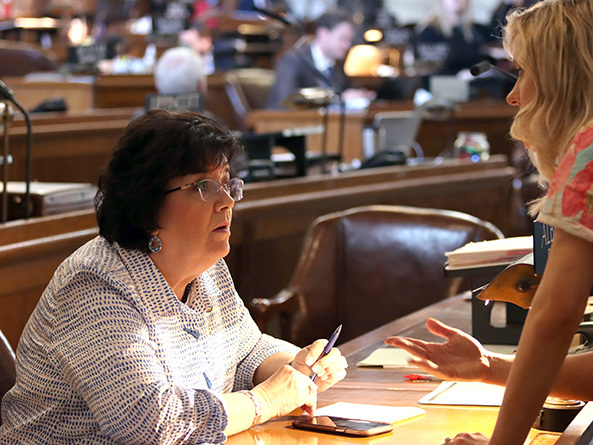Abortion restrictions stall after failed cloture vote
A bill that would prohibit abortions in all but the earliest weeks of most pregnancies stalled on the second round of debate April 27 after a cloture motion fell one vote short.

Current Nebraska law prohibits abortion at 20 weeks post fertilization.
LB626, introduced by Thurston Sen. Joni Albrecht, would require physicians to test for “steady and repetitive contractions” within the gestational sac before inducing an abortion. If such activity is detected, a physician would be prohibited from performing an abortion except in cases of sexual assault, incest or medical emergency.
A physician who knowingly violates the bill’s provisions would be subject to the removal of their license to practice medicine. No one who undergoes an abortion would be considered to be in violation of LB626.
The following would be excluded from the definition of an abortion under the bill:
• removal of an ectopic pregnancy;
• removal of the remains of an unborn child who already has died;
• an act done with the intention of saving the life or preserving the health of the unborn child; and
• termination or loss of life of an unborn child who is not being carried inside an individual’s body during the practice of in vitro fertilization or other assisted reproductive technology.
Ralston Sen. Merv Riepe offered an amendment during select file debate that would replace the bill and instead change the state’s current 20-week post fertilization ban to a 12-week ban.
The amendment would provide exceptions to preserve the life of an unborn child or in cases of a fetal anomaly incompatible with life — defined as one diagnosed before birth that cannot be treated and would, with all reasonable certainty, result in the death of an unborn child within three months.
It would also retain existing exceptions in state law to avert a mother’s death or serious risk of substantial and irreversible physical impairment of a major bodily function.
Riepe, an original co-sponsor of LB626 and a retired hospital administrator, said he was swayed by concerns expressed by doctors regarding a six-week ban — which he characterized as possibly being “a bridge too far.” He said the bill’s provisions as introduced would not offer pregnant individuals adequate time to make critical, life-changing decisions.
“In an ideal world, every child would have the opportunity to live, thrive and experience a fulfilling life,” Riepe said, ‘However, we must acknowledge that we do not live in a utopian society and we face challenges in life that make it difficult to achieve this ideal.”
Albrecht opposed the amendment, saying her bill already represents a compromise from the total ban she introduced last session. Extending the abortion prohibition to 12 weeks would negate the bill’s effectiveness and purpose, she said.
“According to the annual reports from DHHS, the overwhelming majority of abortions in our state take place before 12 weeks,” Albrecht said. “LB626 could save 2,000 precious lives every year from elective abortions [while] the 12-week law will only stop around 300 abortions.”
Seward Sen. Jana Hughes said she could support Riepe’s amendment or the underlying bill without it, saying either option would be an improvement on the current 20-week ban.
She said LB626 as introduced represents a reasonable compromise that would provide exceptions for medical emergencies, rape and incest and does not contain criminal penalties for doctors or women who have abortions.
“Every other state puts the doctor in front of a judge and jury when accused of performing unlawful abortions,” Hughes said.
Lincoln Sen. Danielle Conrad said Riepe’s amendment could provide a path toward a more “humane” approach to women’s health care. LB626 as introduced would ban abortions in Nebraska before most women know they’re pregnant, she said, and provides unclear penalties and no exception for fetal anomalies.
“I’m not sure I could ever support additional restrictions or bans on abortion … [but] I also know I have a duty to ensure harm reduction when given the opportunity,” Conrad said. “I believe that Sen. Riepe’s amendment is a better step forward than the radical ban that is before us. It would provide women an opportunity to make an informed and thoughtful choice with more time.”
Conrad suggested that supporters of LB626 were extending debate in an effort to force a cloture motion and avoid the possible adoption of Riepe’s amendment.
After four hours of debate, Albrecht filed a motion to invoke cloture, which ceases debate and forces a vote on the bill and any pending amendments.
The motion failed on a 32-15 vote. Thirty-three votes were needed.
A failed cloture motion results in debate on a proposal ceasing for the day. LB626 is unlikely to be placed on the agenda again this session.


